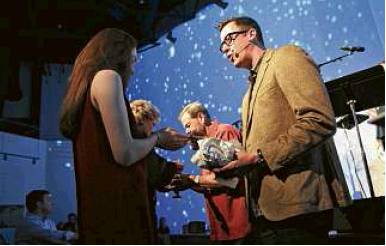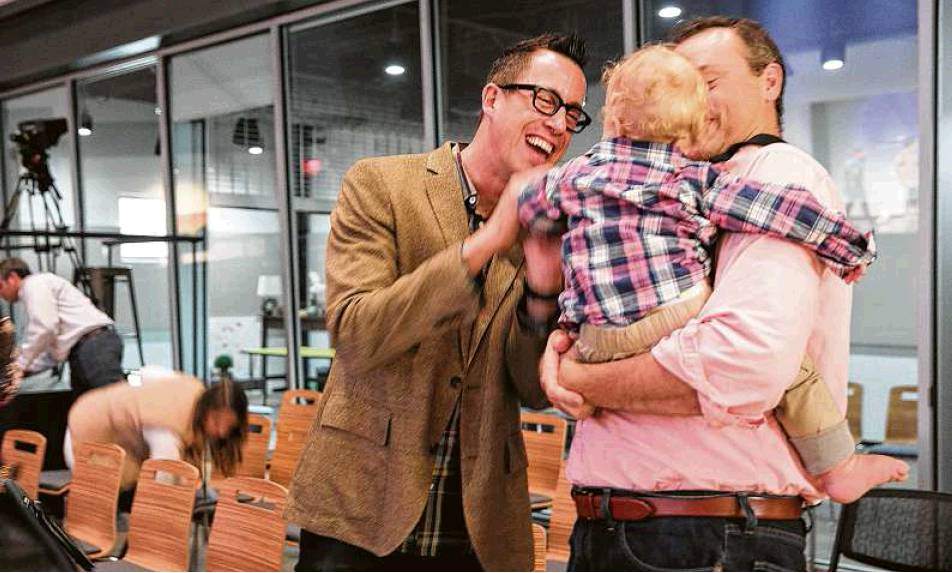Church aims to cross aisles, reach ‘skeptics at heart’
The Story seeks to attract those without a place in other flocks
By Mike Tolson
On Sunday mornings at many mainline Protestant churches around Houston, there comes a moment when the pastor has to doff the robe, ditch the suit, throw on some jeans or khakis, run down the hall to a room with no pews or stained glass, and — most importantly — get his or her head into a different place.
Such is the nature of the modern church. The traditional service in the traditional sanctuary, supported by choir and organ and centuries of custom, is often no longer enough.
For many worshippers, the contemporary service is what they know and expect, conducive not only to casual attire but a more relaxed attitude, comfortable seats, and actual enjoyment. Praise Jesus? Sure, but how about a little raucous praise music to go with it? And cue the slide show while you’re at it.
At first glance, the gathering overseen by Pastor Eric Huffman on the campus of St. Luke’s United Methodist Church looks like any other contemporary service. But in fact there’s a different story behind The Story, the name given to the church within a church that St. Luke’s decided to establish just yards away from its blue-blooded main building across from the southern flank of River Oaks.
It’s an entirely reasonable thing to aim for a younger churchgoer, given that Grandma’s church hasn’t been cutting it with newer generations since the 1960s. The trend of declining church attendance is known to most every leadership team at pretty much every denominational church. But for most of them, the solution, by and large, has been stylistic.
Few, for example, try to lure visitors by emphasizing disagreement and doubt, to the point that The Story asks on its website, “What if Christians stopped treating doubt like an enemy? What if Christians could agree to disagree?”
The Story is not targeting those looking for a new church home or lapsed baby boomers willing to give church another try, or even millennials who consider themselves somewhat Christian but aren’t sure of the need for the trappings of a formal church. It would welcome all of them, of course, but it was created to spread the messages from Jesus’ life and teachings to those who essentially are skeptics at heart, a description Huffman applies to himself.
“Our mission is inspiring nonreligious people,” said Huffman, the 37-year-old son of a Methodist minister who while in college went through a period of rejecting all religion and considered himself an atheist. “People don’t go to church anymore out of a sense of duty or responsibility. Churches are not answering the questions that many people are asking, such as why be a theist? We have to be more honest with people.”
Intellectual approach
The Story is an ongoing dialogue about faith, but more than faith. As Huffman says, it’s about putting “belonging before believing.” The old church model was for all denominations to present their core religious beliefs so that people could find out where they belonged, he said. His vision is to create a caring community and along the way explore reasons for Christian belief and the implications that has for their lives.
The atmosphere is short on judgment and moral superiority, though his sermons are chockablock with impassioned appeals about the essential truth of Jesus as it is explained by his disciples and throughout the New Testament.
“We choose to err on the side of grace, but Iwant to emphasize it’s not an anything-goes culture (at The Story),” said Huffman, whose wife, Geovanna, also is a pastor there. “We do preach strong theology.”
How he preaches is another matter. Huffman’s sermons are equal parts lecture, history lesson and philosophical treatise, garnished with dollops of pop culture and sports references. The common thread is a desire for intellectual engagement.
Referring to a verse in the Gospel of John, he pointed out in one sermon that Christianity specifically is an appeal to the mind, which explains a five-part series this year on the relationship of science and Christianity. (Spoiler alert: He sees no inherent reason for conflict between the two.) He does not apologize for a more intellectual approach to faith, which can lead, for example, to a brief discourse on the meaning of suspicion while discussing the relative merits of various notions of truth.
All of which makes sense given the audience he is trying to reach. The Story Houston, as it is more formally known, claims its members include “life-long Christians, doubtful agnostics, and curious atheists,” according to its website. Huffman said his ministry’s diversity goes much further and includes wide age ranges, Republicans and Democrats, affluent executives and poor single working mothers.
Reaching urban dwellers
Huffman is happy not to preside over a think-alike, do-alike echo chamber where lockstep conformity on matters of belief is seen as a virtue. The goal is a big tent, with many types of people and a lot of differing views.
“That sets us apart and sets us free,” said Huffman, who is quick to be critical of many institutions in his sermons, including the media, government and the church. “We are not departing from the United Methodist brand at all. What we’re trying to do is make the Christian worldview relevant today.”
St. Luke’s oversees four “faith communities,” which include the traditional and contemporary worship services, The Story and the Gethsemane church, created to serve the immigrant community of southwest Houston. The Story was pursued when Senior Pastor Tom Pace decided four years ago that there was a need for a different approach because of the church’s location inside Loop 610.
“That’s at the heart of this ministry,” Pace said. “It has to be aimed at the cultural context you’re trying to reach.”
Pace insisted that St. Luke’s was not struggling when the decision was made, that in fact the church is healthy and growing, with a relatively affluent membership of about 8,000. Creating The Story did not reflect a survival strategy, he said, but a desire to reach people otherwise untouched.
“What we realized was that we couldn’t grow in impact to the city just by doing things we do a little better,” he said. “We were wonderfully positioned inside the Loop to reach urban folk. The Story is not trying to be avant-garde, but there absolutely is a mission behind it. We do feel a sense of calling to reach non-religious people. That has not been the culture of St. Luke’s over the years.”
‘The culture is changing’
The Story has grown more rapidly than anticipated, though membership is less than 10 percent of St. Luke’s total. The key to its success, Pace said, was finding Huffman, who had pastored a similar church in the Kansas City area.
Huffman has an understanding for how to reach out and talk to people who had been turned off by or never much interested in attending church. A practiced storyteller, Huffman often turns to his own story and his crisis of faith as a young man. He’s not loath to criticize the American church as an institution. Don’t believe? Think alot of those Biblical stories sound like a lot of hooey? No big deal, Huffman says. He’s been there. He gets it.
And that’s exactly why St. Luke’s wanted him.
“We bring a message that is aimed at 21st-century people,” Pace said. “We recognize that the culture is changing, and we want to address that.”
As mainline churches across the country cope with new generations who are skeptical of church in general and denominations in particular, the prospects are uncertain. Some are choosing to narrow their appeal. First Presbyterian Church of Houston, for example, has been involved for two years in a struggle to realign with a more socially conservative and evangelical denomination. St. Luke’s has taken the opposite path and resisted the impulse toward tribalism.
“The Story has some of our most conservative and most progressive members, Pace said. “We cross tribal lines. That’s the way it should be.” mike.tolson@chron.com

